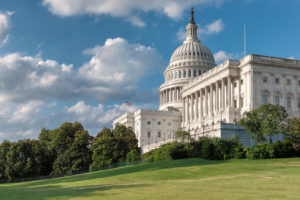
Attorney General Barr summarizes the Mueller report to Congress, DOJ says that the ACA is unconstitutional, and more…
IN THE NEWS
- U.S. Attorney General William Barr submitted a letter to the U.S. House and Senate Committees on the Judiciary summarizing the conclusions of the Special Counsel’s report on allegations of Russian interference with the 2016 presidential election. The letter noted that, although the Special Counsel’s investigation found evidence of Russian efforts to influence the election, it “did not establish that members of the Trump campaign conspired or coordinated with the Russian government in its election interference activities.” Attorney General Barr stated that he intended to release as much of the Special Counsel’s report as possible while adhering to applicable regulations, which permit the Attorney General to release the report if it is in the public interest.
- The U.S. Department of Justice filed a letter with the U.S. Court of Appeals for the Fifth Circuit stating that a December 2018 U.S. District Court for the Northern District of Texas decision invalidating the Affordable Care Act (ACA) should be affirmed. In the earlier opinion, U.S. District Court Judge Reed O’Connor ruled that the elimination of the tax penalty for violating the individual mandate means the ACA is no longer a constitutional exercise of Congress’s taxing power. California Attorney General Xavier Becerra called the lawsuit “as dangerous as it is reckless.”
- In a 6-2 vote, the U.S. Supreme Court held that an individual who does not qualify as the “maker” of a fraudulent statement under a U.S. Securities and Exchange Commission rule may still be found liable for employing “any device, scheme, or artifice to defraud” or engaging in any practice that operates “as a fraud or deceit.” Writing for the majority, Justice Stephen Breyer held that the rule’s language was “sufficiently broad” to provide a basis for liability. In dissent, Justice Clarence Thomas wrote that the majority eviscerated the Janus doctrine, which limits liability under the rule when the individual lacks “ultimate authority over the statement.”
- The U.S. Supreme Court declined to stay a U.S. Department of Justice rule banning bump stocks pending constitutional and Administrative Procedure Act challenges to the rule. The amended rule now classifies bump stock-type devices as machine guns, equating them to fully automatic weapons. Fully automatic weapons are illegal under current regulations.
- The U.S. House of Representatives passed a bill that aims to address the gender pay gap by banning employers from asking about prospective employees’ previous salaries, prohibiting retaliation against employees who share wage information, and mandating disclosure of salary data with the Equal Employment Opportunity Commission. Representative Rosa DeLauro (D-Conn.), who introduced the bill, described the vote as a “transformational victory for working women and their families” that will allow women “to fight against systemic wage discrimination and receive the pay and economic security they have earned.” Representative Virginia Foxx (R-N.C.) argued that the bill will do little to help working women and characterized it as “a bill for trial lawyers, plain and simple.”
- The Federal Trade Commission (FTC) asked seven major Internet service providers for information on how they gather and use consumer data in order to better understand how the evolution of telecommunication companies into “vertically integrated platforms that also provide advertising-supported content” affects their privacy practices. FTC Chairman Joe Simons reportedly called the orders the first in a larger plan to increase scrutiny of telecommunications companies’ consumer privacy practices. Commissioner Rohit Chopra expressed concern that the action was too narrow, stating that the orders “only scratch the surface on what the public needs to know.”
- For the first time in 50 years, the U.S. Department of Labor will seek to update its regular rate requirements. Current regulations do not explain whether employment perks should be included in calculating an employees’ regular rate of pay, resulting in fewer benefit programs. The proposed update would allow employers to offer wellness programs, unused paid leave, travel expenses, and other benefits that would not be part of employees’ regular rate of pay.
- Puerto Rico became the fourth jurisdiction in the U.S.—after Hawaii, California, and Washington, D.C.—to adopt a 100 percent renewable energy portfolio standard when its House of Representatives passed the Puerto Rico Energy Public Policy Act. The bill, which awaits signature by Governor Ricardo Rosselló, would set a goal of procuring all of the island’s energy from renewable sources by 2050 and banning coal power after 2028. “While leaders across the country are talking about how to best innovate and integrate renewable energy into their economy, today we’re proud to say we’re actually doing it,” Governor Rosselló said.
- The European Union passed a copyright measure, shifting the responsibility of verifying copyrights from copyright holders to providers of copyrighted content. Andrus Ansip, Vice-President for the Digital Single Market, and Mariya Gabriel, Commissioner for Digital Economy, expressed support for the measure, stating that the new rule “will improve the position of creators in their negotiations with big platforms which largely benefit from their content.” Google previously warned, however, that the rule would have unintended consequences by benefiting larger publishers that can afford commercial licenses at the expense of smaller publishers without the resources to secure licensing agreements.
WHAT WE’RE READING THIS WEEK
- In a forthcoming paper for the Michigan Law Review, Nicholas Bagley of the University of Michigan Law School urged administrative lawyers to question the assumption that strict procedural rules are essential to ensure governmental legitimacy and prevent agency capture. By hampering agencies’ efforts to achieve substantive outcomes that further the public interest, Bagley contends, onerous procedural requirements such as notice-and-comment rulemaking and so-called hard-look judicial review undermine public faith in the administrative state and feed a cycle of “endless hand-wringing over agency legitimacy.”
- José Gabilondo of Florida International University’s College of Law discussed a 2017 amendment to the Cuban Asset Control Regulation on direct financial transactions with entities in the Cuban military, intelligence, and security sectors in a recent paper. The new regulation created a subset of “heightened sanctions within the Cuba sanctions program,” according to Gabilondo. Although Gabilondo argued that the amendment will negatively impact the Cuban economy, he also acknowledged that it “leaves the Cuban government with some freedom of action to restructure commercial activities.”
- A recent paper by World Bank economists Tito Cordella and Shantayanan Devarajan suggested that relaxing emission standards may encourage companies to adopt more sustainable technologies but may increase production, resulting in more pollution. In addition, their research contended that lowering environmental standards would be more costly for companies if the standards are reversed years later.



